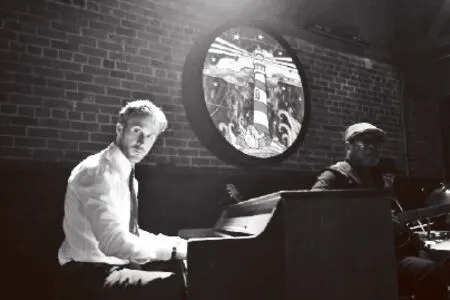爱乐之城
⊙ 翻译:Portia
爱乐之城

⊙ 翻译:Portia
励志片+爱情片+歌舞片,这就是成功电影的模式吗?大概不会有人下这种定论,但《爱乐之城》成功了。它不仅票房一路飙红,而且将多个大奖收入囊中,其中包括七项奥斯卡奖和七项金球奖。也许在全球多国经济形势都不怎么稳定的大环境中,人们需要励志片给自己打气,需要爱情片让自己陶醉,需要歌舞片给自己娱乐。于是,生逢其时的《爱乐之城》从首映到奥斯卡,一路顺风顺水。
《爱乐之城》的内核是一个并不复杂的故事——两个在逐梦道路上的年轻人相互温暖支撑,最后分手。故事发生在当代的洛杉矶,年轻的米娅怀揣当演员兼编剧的梦想,一边打工,一边频频试镜。塞巴斯蒂安是一名系丝绸领带的爵士钢琴师,他想开家爵士乐俱乐部,但他所痴迷的音乐风格似乎更适合博物馆,几乎没有人愿意花钱去听。为了生存,他违心加入了一支流行爵士乐队。同样追求梦想的两人在这座城市里相遇,在唱唱跳跳中坠入了爱河,相互慰藉扶持,一起追求梦想。在经历了一系列挫折、分歧后,最终,两人都成功了,但却没能留在对方身边。
本片涉及大量的爵士乐知识,比如选段中出现的多个橙色人名都是美国爵士乐史上的代表人物——感兴趣的同学不妨查阅他们的生平事迹,这也是一个扩充知识面的好机会哦。


Director
Damien Chazelle
Cast
Ryan Gosling…Sebastian
Emma Stone…Mia
John Legend…Keith
1 初次邂逅几个月后,米娅再次见到了塞巴斯蒂安,两人聊着各自的梦想。

Mia: My aunt was an actress.
Sebastian: Oh, OK.
Mia: She was in a traveling theatre company. I grew up in Boulder City, Nevada. So across the street from my house, there was this little library that had an old movies section. And so she…she took me, and we spent an entire day watching all these old movies, like Notorious and Bringing Up Baby, Casablanca.
Sebastian: She sounds1)incredible.
Mia: She was incredible. And I would put on all these plays in my bedroom and it would basically be just she and I2)reenacting the scenes from the movies. And then I would write my own plays.
Sebastian: Wow.
Mia: Yeah.
(Mia shows Sebastian around.)
Mia: So, anyway, I left college after two years to come here. And, um, my last3)audition was for a teen soap4)pitched as Dangerous Minds meets The O.C. So, yeah, should’ve been a lawyer.
Sebastian: ’Cause the world needs more lawyers.
Mia: It doesn’t need more actresses.
Sebastian: You’re not just an actress.
Mia: What do you mean “just an actress”?
Sebastian: You said it yourself. You…you were a child5)prodigy6)playwright.

Mia: That is not what I said.
Sebastian: Well, you’re too modest to say it, but it’s true. So you could just write your own roles, you know. Write something that’s as interesting as you are. And you don’t have to audition for this… Look at Louis Armstrong, you know. He could have just played the7)marching band charts that he was given, but he didn’t do it. What did he do?
Mia: What did he do?
Sebastian: Well, he made history, didn’t he?
Mia: Well, I’m gonna stop auditioning, and I’m gonna make history instead.
Sebastian: Well, my work is done here.
Mia: I should probably tell you something now, to get it outta the way. I hate jazz. (Sebastian suddenly stops. ) Are you OK?
1) incredible [In΄kredIb(ə)l] adj. 不可思议的,非常了不起的
2) reenact [΄riːI΄nækt] v. 再扮演
3) audition [ɔː΄dIʃ(ə)n] n. 试唱,试演
4) pitch [pItʃ] v. 为……做宣传
5) prodigy [΄prɒdIdʒI] n. 天才,奇才
6) playwright [΄pleIraIt] n. 剧作家,编剧
7) marching band chart 仪仗队曲目
Sebastian: What do you mean you hate jazz?
Mia: It just means that when I listen to it, I don’t like it.
Sebastian: Yeah, but it’s just a blanket statement that “you don’t like jazz.” What are you doing right now?
Mia: Nothing.
(Sebastian takes Mia to a jazz club.)
Sebastian: You know, I just think that people when they say that they, you know, hate jazz, they just…they don’t have8)context. They don’t know where it comes from, you know? Jazz was born in a little9)flophouse in New Orleans, and then just because people were10)crammed in there, they spoke five different languages, they couldn’t talk to each other. The only way that they could communicate was with jazz.
Mia: You know, what about Kenny G注?
Sebastian: What?
Mia: What about Kenny G? I mean, what about elevator music—you know, jazz music that I know…
Sebastian: What about it?
Mia: …from my life. I just…I mean, I find it relaxing.
Sebastian: It’s not relaxing. It’s not. It’s not. Sidney Bechet shot somebody because they told him he played a wrong note. And that’s hardly relaxing.
Mia: You know, where I grew up, there was this station called KJAZZ 103. And people would just put on that station when they had a11)cocktail party…
Sebastian: Right.
Mia: And everyone would, kind of, just talk over it.
Sebastian: I know.
Mia: As it was…
Sebastian: That’s part of…OK, OK. So I think that that’s part of the problem is that you can’t hear it, you know. You have to see it, you have to see what’s12)at stake. I mean, look at these13)fellas. Look at, look at the, the14)sax player right now. He just15)hijacked the song. He’s on his own trip. Every one of these guys is16)composing, they’re rearranging, they’re writing and they’re playing the17)melody. They’re just…and now, look, the trumpet player. He’s got his own idea. And so…it’s conflict, and it’s compromise, and it’s just…it’s new every time, it’s18)brand new every night. It’s very, very exciting.
And it’s dying. It’s dying, Mia. It’s19)dying on the vine. And the world says, “Let it die. It had its time.” Well, not on my watch.
Mia: What are you gonna do?
Sebastian: I’m gonna have my own club. Mia: Really?
Sebastian: Yes. We’re gonna play whatever we want, whenever we want, however we want, as long as it’s pure jazz.

短语学习
● blanket statement:概括性说法,blanket在短语中为形容词,作“总的,综合的”解。该短语指对某类事物的表述是总括性的、笼统的,如:You may not like her, but a blanket statement saying everyone hates her is not fair.(也许你不喜欢她,但笼统地说人人都恨她并不公平。)
● on someone’s watch:我们熟悉的watch作名词时的其中一个含义就是“守卫,值班”,on (someone’s) watch的最初含义指某人在值班,在岗位上,后来渐渐多了一层在某人的管辖、关心或干预下的意思,如:It didn’t happen on my watch, so you should ask the next CEO.(事情没有发生在我任上,这得问下一任首席执行官。)
2 一直求职无果的塞巴斯蒂安应同学基思之邀,加入其新组建的乐队。在听了塞巴斯蒂安与乐队的合奏后,基思对其演奏大为不满。

Keith: I know. It’s different. But you say you wanna save jazz. How are you gonna save jazz if no one’s listening? Jazz is dying because of people like you. You’re playing to 90-year-olds at The Lighthouse. Where are the kids? Where are the young people? You’re so obsessed with Kenny Clarke and Thelonious Monk. These guys were20)revolutionaries. How are you going to be a revolutionary, if you’re such a traditionalist? You’re holding on to the past, but jazz is about the future.
And I know. The other guy, he wasn’t as good as you. But you’re a pain in the ass, man.

短语学习:a pain in the ass
这个短语指令人讨厌的人或事,恼人的家伙。要注意的是,被骂的对象通常不是坏人或坏事,只不过给人感觉非常不好,让人不愉快。它可用于人(如你不喜欢的室友、同事等)或事(如搬家、堵车等)。英式英语的拼写是a pain in the arse。尽管你可能经常在英美影视作品中听到这个表达,但这是无礼之言,不可随意使用。相比之下,你可用a pain in the neck,如:My neighbor is a pain in the neck/ass/arse, playing violin at six every morning.(我的邻居每天早上六点拉小提琴,真是讨厌。)
3 米娅与塞巴斯蒂安就他们的现状发生了争吵。随后,米娅自编自演的独角戏失败了,她回到父母在内华达州的家。塞巴斯蒂安从洛杉矶开车来找米娅。
Mia: Why did you come here?
Sebastian: Because I have good news.
Mia: What?
Sebastian: Amy Brandt, the21)casting
director.
Mia: Yeah?
Sebastian: She was at your play, and she loved it. And she loved it so much that she wants you
8) context [΄kɒntekst] n. 上下文,背景
9) flophouse [΄flɒphaʊs] n. 廉价的低级住所或旅馆
10) crammed [kræmd] adj. 拥挤的
11) cocktail [΄kɒkteIl] n. 鸡尾酒
12) at stake 濒临危险,得失攸关
13) fella [΄felə] n. 伙伴,伙计,小伙子
14) sax [sæks] n. 萨克斯管,saxophone的简称。
15) hijack [΄haIdʒæk] v. 绑架,劫持
16) compose [kəm΄pəʊz] v. 作曲
17) melody [΄melədI] n. 曲调,主调
18) brand new 崭新,全新
19) die on the vine 中途夭折
20) revolutionary [΄revə΄luːʃənərI] n. 革命派,创新派
21) casting director 选角导演

注:肯尼·基,20世纪八九十年代美国杰出的萨克斯演奏家、最畅销的器乐演奏家,他的专辑全球销量超过七千五百万。to come in tomorrow, and audition for this huge movie that she’s got.
Mia: I’m not going to that. I’m not going to that. Sebastian: What?
Mia: That one’s gonna be…no. That one’s gonna be…
Sebastian: I’m sorry?
Mia: That will kill me.
Sebastian: What?!
Mia: What? What? Shh. Stop!
Sebastian: No!!
Mia: Shh, you have to be quiet. They’re gonna call…they’re gonna call the police…
Sebastian: If you want me to be quiet, you have to make some22)goddamn sense. You tell me why you’re not going to. Why?
Mia: Because…because I’ve been to a million of auditions, and the same thing happens every time! Where I get interrupted because someone wants to get a sandwich! Or I’m crying and they start laughing! Or there’s people sitting in the waiting room, and they’re…and they’re like me but prettier and better at the…because maybe I’m not good enough!
Sebastian: Yes, you are.
Mia: No. No, maybe I’m not.
Sebastian: Yes, you are.
Mia: Maybe I’m not.
Sebastian: You are.
Mia: Maybe I’m not.
Sebastian: You are.
Mia: Maybe I’m one of those people that has always wanted to do it, but it’s like a23)pipe dream for me, you know? And then you, you said it. You, you change your dreams, and then you grow up. Maybe I’m one of those people, and I’m not supposed to. And I can go back to school, and I can find something else that I’m supposed to do.’Cause I left to do that and it’s been six years, and I don’t wanna do it anymore.
Sebastian: Why?
Mia: Why what?
Sebastian: Why don’t you wanna do it anymore?
Mia: ’Cause I think it hurts for a bit too much.
Sebastian: You’re a baby.
Mia: God! I’m not a baby. I’m trying to grow up.
Sebastian: You are. You’re crying like a baby.
Mia: Oh my God!
Sebastian: And you have an audition tomorrow at 5∶30. I’ll be out front at 8 am. You’ll be out front or not, I don’t know. (Sebastian starts his car.)
Mia: How did you find me here?
Sebastian: The house in front of the library.

这段对话主要是塞巴斯蒂安在说服米娅。塞巴斯蒂安话不多,从对米娅的肯定到使用激将法,他用简单甚至重复的话不断消除米娅对自己的怀疑。另一方面,米娅诉说自己历经多次失败后的内心纠结,语速的变化反映了她的焦虑情绪。建议同学们反复听该选段,特别要留意两人的语速变化,然后找个学习搭档一起role play吧。
4 米娅试镜后,与塞巴斯蒂安见面。

Sebastian: When do you find out?
Mia: Um, they said the next couple days. But I’m not expecting to find anything out.
Sebastian: You’re gonna get it.
Mia: I really might not.
Sebastian: Yes, you are.
Mia: I don’t want to be disappointed.
Sebastian: I know. I know. I know these things.
Mia: Where are we?
Sebastian: Griffith Park.
Mia: Where are we?
Sebastian: I know. I don’t know.
Mia: What do we do?
Sebastian: I don’t think we can do anything,’cause when you get this…
Mia: If I get this.
Sebastian: When you get this, you gotta give it everything you got. Everything. It’s your dream.
Mia: What are you gonna do?
Sebastian: I gotta follow my own plan, you know? Stay here, and get my own thing going. You’re gonna be in Paris. Good jazz there. And you love jazz now, right?
Mia: Yes.
Sebastian: I guess we’re just gonna have to wait and see.
Mia: I’m always gonna love you.
Sebastian: I’m always gonna love you, too.

● Sebastian: You’re gonna get it.
Mia: I really might not.
Sebastian: Yes, you are.
● Sebastian: I don’t think we can do anything, ’cause when you get this…
Mia: If I get this.
Sebastian: When you get this, you gotta give it everything you got. Everything. It’s your dream.
我们可以通过这两组对话看到两人不同的态度。第一组,塞巴斯蒂安用的是表示肯定的将来时,而米娅用的是情态动词的否定式。第二组,塞斯蒂安同样用了表示肯定的将来时,而米娅则用假设句;简单的when与if,反映的态度截然不同。建议同学们反复听这段对话,琢磨两人如何用语气和重音表达自己内心的想法。
22) goddamn [΄ɡɒddæm] adj. 讨厌的
23) pipe dream 白日梦
参考译文
1
米娅:我姑妈是一名演员。
塞巴斯蒂安:哦,这样。
米娅:她在一家旅行剧团工作。我是在内华达州的博尔德市长大的。在我家对面有一个小图书馆,里面有一个老电影区。于是她……她会带我去那里,然后我们会一整天都在看那些老电影,如《美人计》《育婴奇谭》《卡萨布兰卡》等。
塞巴斯蒂安:听起来她很了不起。
米娅:她是真的很了不起。然后我会在卧室里表演这些影片的选段,基本上就是我和她一起重演电影里的一些桥段。之后我会写自己的剧本。
塞巴斯蒂安:哇哦。
米娅:就是这样。
(米娅带塞巴斯蒂安四处转。)
米娅:总而言之吧,我上了两年大学就辍学来到这里。然后,呃,我上一次试镜的是一部青少年肥皂剧,这部剧号称是《危险游戏》与《橘子郡男孩》的合体。所以说,唉,当初应该去当律师。
塞巴斯蒂安:因为这个社会需要更多的律师。
米娅:显然并不需要更多的演员。
塞巴斯蒂安:你不止是个演员。
米娅:“不止是个演员”是什么意思?
塞巴斯蒂安:你刚自己也说了。你……你是个编剧神童。米娅:我没那么说。
塞巴斯蒂安:不,你只是太谦虚罢了,但事实确实如此。所以你完全可以为你自己的角色写剧本,你知道吗,写些和你一样有趣的角色。你根本就没必要去试镜……你看看路易斯·阿姆斯特朗,他本可以只演奏那些别人给他的仪仗队曲目,但他并没这么做。他做什么了呢?
米娅:他做什么了?
塞巴斯蒂安:嗯,他创造了历史,对不对?
米娅:哦,我不要再去试镜了,而是要去创造历史。
塞巴斯蒂安:嗯,我只能帮你帮到这儿了。
米娅:我想该跟你坦白一件事了,说完了事。我讨厌爵士乐。(塞巴斯蒂安突然停住了脚步。)你还好吧?
塞巴斯蒂安:你说你讨厌爵士乐是什么意思?
米娅:就是我听爵士乐的时候,我并不喜欢它。
塞巴斯蒂安:哦,但“你不喜欢爵士乐”只是笼统说法罢了。你接下来有事吗?
米娅:没事。(塞巴斯蒂安带米娅去一家爵士乐吧。)
塞巴斯蒂安:我在想啊,有些人说他们讨厌爵士乐,可你知道吗,他们只是……不懂它的背景而已。他们不知道这音乐是从哪里来的,你知道吗,爵士乐诞生于新奥尔良的一间狭小的廉价房。当时因为那里住满了人,他们说五种不同的语言,没法交流,因此爵士乐便成了他们唯一的交流方式。
米娅:那么,肯尼·基呢?
塞巴斯蒂安:什么?
米娅:那肯尼·基的音乐呢?我是说,电梯音乐呢?呃,那就是我知道的爵士乐……
塞巴斯蒂安:电梯音乐怎么了?
米娅:……我生活中接触到的。我只是……我的意思是,我觉得那种音乐让人感到放松。
塞巴斯蒂安:爵士乐并不轻松。不是的,不是的。西德尼·比切特开枪打人就因为他们说他吹错了一个音,所以说,它一点儿也不轻松。
米娅:你知道吗,在我成长的地方有个叫KJAZZ 103的电台。大家在开鸡尾酒会的时候就听这个电台播放的音乐……
塞巴斯蒂安:嗯?
米娅:接着每个人就只是聊天,并没人去听。
塞巴斯蒂安:我懂。
米娅:就好像它……
塞巴斯蒂安:那是其中……好了,好了。所以我就觉得,那是其中的一个原因,就是你听不懂,对吧。你必须亲自去看,亲自去发现那些岌岌可危的东西。我的意思是,看看这些人。看看那个正在吹萨克斯管的人。他完全掌控了这首曲子,他在演绎自己对乐曲的理解。他们每个人都在创作,都在重新编曲,他们在边创作,边演奏这首曲子。他们就是……现在你看看那个小号手,他有了自己的思路。所以说……这是冲突和妥协,就是……每次演奏都不一样,每晚都是全新的。这真的非常激动人心。
可是,它正一步一步地走向消亡,正一步一步地走向消亡啊,米娅。它不应该就这样夭折。可世人却都在说:“让它去吧,它已经过了它的黄金时期。”哼,但我是不会坐视不理的。
米娅:那你打算怎么办?
塞巴斯蒂安:我打算创建自己的俱乐部。
米娅:真的吗?
塞巴斯蒂安:是的。到时我们就可以想演奏什么就演奏什么,想什么时候演奏就什么时候演奏,想怎样演奏就怎样演奏,只表演纯粹的爵士乐。
2
基思:我知道。他们的风格与你的不一样。你口口声声说你要拯救爵士乐,可如果爵士乐没人听的话,你拿什么来拯救它?就是因为有像你这样的人,才导致爵士乐的衰亡。你在灯塔酒吧里给那些九旬老人演奏。那小孩子呢?年轻人呢?你对肯尼·克拉克和塞隆尼斯·蒙克如此着迷,可这些人都是划时代的人物。如果你自己就是个保守派,那你怎样才能成为一个划时代的人物呢?你过于执着于往昔了,但爵士乐是未来的音乐。
我也知道,那个人没你厉害,可是老兄,你真是个让人头痛的家伙。
3
米娅:你来这儿做什么?
塞巴斯蒂安:因为我有好消息。
米娅:什么消息?
塞巴斯蒂安:艾米·勃兰特,那个选角导演。
米娅:她怎么了?
塞巴斯蒂安:她去看了你的演出,而且表示她非常喜欢,所以她想要你明天去找她试镜,为她手上这部大制作试镜。
米娅:我不去,我不打算去。
塞巴斯蒂安:什么?
米娅:那会……不行。那会……
塞巴斯蒂安:你说什么?
米娅:那会要我命的。
塞巴斯蒂安:什么?!
米娅:干嘛?干嘛?嘘,别叫!
塞巴斯蒂安:不行!
米娅:嘘,你得声音小点儿。他们会叫……他们会叫警察……
塞巴斯蒂安:你要是想让我小点儿声,你就得讲点道理才行。你跟我说为什么你不想去,为什么?
米娅:因为……因为我去过无数次试镜,每次结果都一样!人们打断我就因为他们想要吃个三明治!要不就是我哭的时候他们都笑了!要不就是在外面等的那些人,她们……她们和我一样,但就是长得更漂亮和更会……也许只是因为我不够好!
塞巴斯蒂安:不,你很好。
米娅:不。可能我不够好。
塞巴斯蒂安:你很好。
米娅:可能我不够好。
塞巴斯蒂安:你很好。
米娅:可能我不够好。
塞巴斯蒂安:你很好。
米娅:或许我和那些一心想实现梦想的人一样,但对我来说这就像个白日梦,你懂吗?你说过的,人……人只要换个梦想,就长大了。也许这说的就是我,我注定不会成功的。我可以回学校去,可以去做其他注定该是我做的事。因为我离开家去追梦,已经努力六年了,我不想再继续下去了。
塞巴斯蒂安:理由呢?
米娅:什么理由?
塞巴斯蒂安:你不想再试下去的理由。
米娅:因为我被它伤得有点深。
塞巴斯蒂安:你就是个小孩。
米娅:去你的!我才不是小孩,我在努力长大。
塞巴斯蒂安:你就是。你现在哭得像个小孩似的。
米娅:噢,我的天!
塞巴斯蒂安:你明天的试镜时间是下午五点半,我明早八点到这儿来。至于你会不会在这里出现,全在你了。
(塞巴斯蒂安启动车子。)
米娅:你是怎么找到这儿来的?
塞巴斯蒂安:图书馆正对着的那栋房子。
4
塞巴斯蒂安:你什么时候会知道结果?
米娅:嗯,他们说就这几天,但是我不指望有任何结果。塞巴斯蒂安:你会通过的。
米娅:我很可能不会。
塞巴斯蒂安:你会的。
米娅:我不想使希望变成失望。
塞巴斯蒂安:我懂,了解。我了解这种感受。
米娅:我们这是在哪儿?
塞巴斯蒂安:格里菲斯公园。
米娅:我们之间算什么?
塞巴斯蒂安:我懂你的意思,我也不知道。
米娅:我们要怎么办?
塞巴斯蒂安:我觉得我们现在计划不了什么,因为等你得到这个机会……
米娅:如果我得到这个机会。
塞巴斯蒂安:等你得到这个机会,你就会竭尽全力,全力以赴,因为那是你的梦想。
米娅:那你会做什么呢?
塞巴斯蒂安:我会继续我自己的计划,你知道吗?留在这里,并启动我的计划。你到时候会在巴黎,那里的爵士乐非常不错。你现在也喜欢上爵士乐了,对不?
米娅:是的。
塞巴斯蒂安:我猜我们只能让时间来见分晓了。
米娅:我会一直爱着你。
塞巴斯蒂安:我也会一直爱着你。

